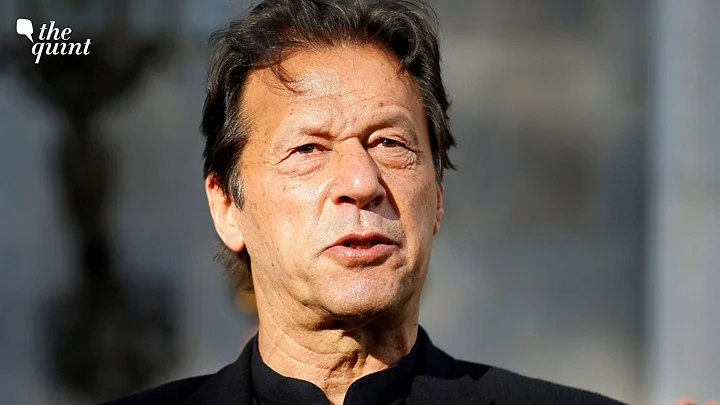From being an international cricket star to leading a coup-prone country, Imran Ahmed Khan Niazi, better known as Imran Khan has now become the first prime minister in Pakistan's history to be ousted through a no-confidence motion.
The cricketer, who led a wobbly team into becoming the champions in the 1992 Cricket World Cup, failed to repeat the magic in politics and was knocked out by the Pakistan Opposition in the middle of his first tenure.
With Saturday night's vote, Khan, like all the 21 Pakistan PMs who came before him, got ousted before he could complete a five-year term. This was, however, the first time that a Pakistani prime minister has been voted out by his own Parliament.
We take a look at his life and career.
Political Career
Following the Pakistan team's 1992 World Cup victory, Khan had garnered a nearly mythological status in the country. Since then, the Oxford-educated athlete has used his popularity to launch a political career, creating the Pakistan Tehreek-e-Insaf (PTI) in 1996 and preaching a message of change.
Khan's PTI had been in the forefront of widespread protests against alleged vote manipulation in the 2013 election, in which he had garnered roughly 19 percent of the vote.
The politician had also used an anti-corruption theme to lead protests against former Prime Minister Nawaz Sharif, calling for a criminal probe after leaked documents from a Panama law firm revealed Sharif and his family had concealed assets overseas.
Fallout With The Pakistan Army
Earlier accused of enjoying the support of the Pakistan Army, which traditionally controls the defence and external affairs portfolios, Khan has increasingly been at loggerheads with the Pakistan Army Chief Qamar Javed Bajwa over the past several months.
Last year, when eBajwa attempted to transfer Lt General Faiz Hameed from the ISI, Khan blocked the move and made it a point of contention. Though he agreed later, the relationship had turned sour.
Recently, the army also distanced itself from Khan's profound anti-America sentiments, as he also went on to claim that there was a "foreign conspiracy to oust his government."
Moreover, as he attempted to foster strong ties with Russia, General Bajwa took a firm view against Russia over its invasion of Ukraine.
Anti-Liberal Ideologies
But back at home, Khan's detractors had also earlier dubbed him as "Taliban Khan" — an allusion to his previous support for Taliban talks in Pakistan. He has also professed respect for the tribal judicial system, which still sees women and young girls as property when it comes to resolving conflicts.
Along with that Khan had also backed the blasphemy law, which calls for the death sentence for anybody who insults Islam or the Prophet Muhammad.
In Pakistan, where the mere idea of blasphemy can inspire mob violence, the legislation has been widely criticised, with claims that it has been used to settle personal disputes and to target minorities.
Women's rights organisations have also slammed Khan's assaults on "Western feminism," claiming it "degraded the role of a mother." Pakistani women have accused Khan of catering to his orthodox religious constituency on social media.
In June 2021, Khan used "common logic" to explain a spike in publicly publicised rape incidents in Pakistan, claiming that women who wear "very few clothes" will "have an impact on men unless they are robots." This led to huge outrage by female rights activists.
On the Personal Front
Khan grew up in a comparatively prosperous, upper middle-class circumstances and obtained a privileged education.
He attended Lahore's Aitchison College and Cathedral School, as well as the Royal Grammar School Worcester in England, where he excelled at cricket. He entered in Keble College, Oxford, in 1972 and graduated in 1975 with a degree in Philosophy, Politics, and Economics.
In 1996, he married wealthy British heiress Jemima Goldsmith. After their divorce in 2004, Khan's two sons live with Goldsmith, his first wife, who has publicly supported Khan's political ambitions and complimented his leadership skills.
Reham Khan, his second wife, divorced him within a year and also published a book criticising him and members of the PTI.
"The man who claims to worry about the Qom has held the whole system and state hostage while he collects funds for his own charity SKMT not bothering to turn up to the parliament", she tweeted after the passage of the no-confidence motion on Sunday.
In 2018, after denying months of conjecture, he married his third wife, Bushra Maneka. He said he was pulled to Maneka's spirituality after his marriage to the mother of five, also known as Pinki Pir.
The Current Crisis
The country's economic situation is at the foundation of the political unrest. The Pakistani economy is struggling to stay afloat, fuelled by the Ukraine war, a growing trade deficit, and massive debt. Pakistan is on the verge of bankruptcy, with consumer price inflation above 12 percent and currency depreciation of more than 50 percent in the last five years.
Khan's government has been accused of pulling the country into a chaos.
Opposition parties filed a motion of no confidence in him with the National Assembly Secretariat on 8 March, 2022.
On 1 April, 2022, Khan declared that the "system" had offered him three alternatives in response to a no-confidence resolution in the National Assembly: "resignation, no-confidence [vote], or elections."
A no-confidence vote was held on 10 April and he was dismissed from office, becoming Pakistan's first prime minister to be thrown out of power by a vote of no-confidence.
The unified opposition, which included a mix of socialist, liberal, and profoundly religious factions, got 174 votes in the 342-member house, surpassing the required 172 votes to dismiss the Prime Minister.
